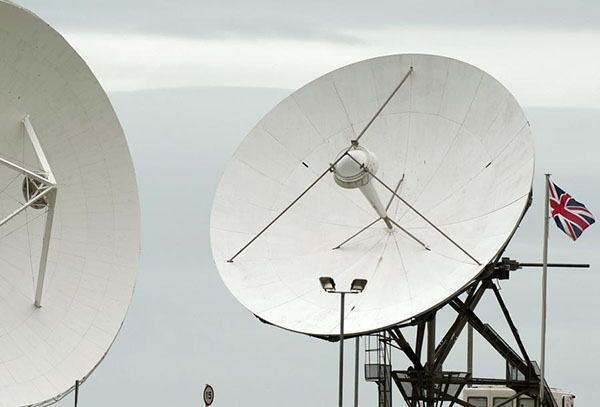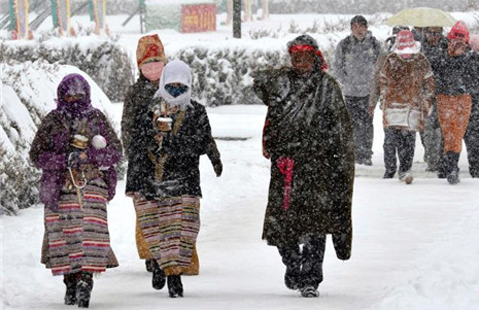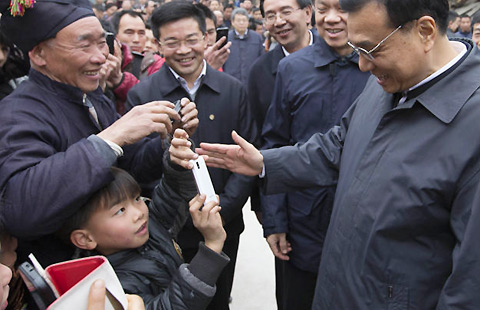The peeping eyes of the United States
Updated: 2015-02-10 11:45
(Xinhua)
|
||||||||
 |
|
Satellite dishes are seen at GCHQ's outpost at Bude, close to where trans-Atlantic fibre-optic cables come ashore in Cornwall, southwest England in this file photograph dated June 23, 2013. [Photo/Agencies] |
BEIJING - The United States, the birthplace of the Internet, has now also turned into the most aggressive country in cyber surveillance, espionage and hacking, despite its repeated complaints about cyber attacks against US facilities.
While labeling itself as the biggest victim in the "cyber-warfare," the United States is demonstrably the origin of the world's most cyber attacks. According to the estimates of Symantec, a leading cyber security company, 25 percent of the Internet attacks were launched inside the US territory.
With the help of thousands of well-trained hackers and some of the world's fastest computers, the US government and its intelligence agencies have been spying practically every corner of the cyber world.
WEDGING CYBER-WARFARE
The US government is apt to maximize its dominating technological advantages and has launched many cyber-hacking operations targeting strategic facilities of other countries.
The New York Times reported in June 2012 that US President Barack Obama had, in secret, upgraded a cyber attack scheme against Iran which was initiated by his predecessor, George W. Bush.
In May 2012, the US intelligence agencies, working with Israel, released a computer virus called "Flame," which partly paralyzed the Internet in Iran and other countries in the region.
According to US media, "Flame" was a weapon for Washington to gather key intelligence that would pave the way for further cyber attacks on the Iranian nuclear facilities.
Some of US officials confessed in private that in the 2003 Iraq War, which overturned Saddam Hussein's regime, hackers with the US military invaded the telecommunication system of the Middle East country, resulting in temporary malfunctions of mobile services and satellite phones in several of Iraq's neighboring countries.
The attack on the telecommunication system of the former Yugoslavia in the Kosovo War from February 1998 to June 1999 also brought "collateral damage" upon the satellites of the International Telecommunications Satellite Organization, severing communication for several days.
Moreover, the United States, with the assistance of South Korea and other allies, invaded the Internet in the Democratic People's Republic of Korea (DPRK) in 2010 and managed to acquire complete access to the country's servers, from which the United States could filter and watch every bit of information on the Internet of the DPRK.
SPYING ON ALLIES AND US CITIZENS
Besides hacking into the countries that are in antagonistic relations with the United States, the US "invisible sword" of cyber-hacking has also fallen onto its allies.
According to the files released by whistleblower Edward Snowden, the US National Security Agency (NSA) has been spying on the email and cell phone communications of as many as 35 world leaders, including German Chancellor Angela Merkel.
US spooks also intercepted the satellite signals of Britain, Japan and Norway.
The notorious PRISM program, under which the NSA acquires digital communications from Facebook, Google, Microsoft, Apple and other US Internet companies, was allegedly targeting foreigners, but the communications of Americans could be conveniently collected and stored in NSA databases.

 Lhasa sees heaviest snow in two decades
Lhasa sees heaviest snow in two decades
 Samba sparkles in Brazil's Carnival season
Samba sparkles in Brazil's Carnival season
 'Taxi' wins Golden Bear in 65th Berlinale
'Taxi' wins Golden Bear in 65th Berlinale
 Let's take a selfie
Let's take a selfie
 Eight-year-old turns camera on premier
Eight-year-old turns camera on premier
 Pole dance under rime trees
Pole dance under rime trees
 Couples go to extreme height for love
Couples go to extreme height for love
 When Spring Festival rush encounters Valentine's Day
When Spring Festival rush encounters Valentine's Day
Most Viewed
Editor's Picks

|

|

|

|

|

|
Today's Top News
Apple studies self-driving car, auto industry source says
Second-longest railway built overseas by China rolls out
Graft buster publishes corruption cases in environmental sector
One dead, three police hurt in shooting at Copenhagen Islam debate
Xi's New Year visit marks village homecoming
Jackie Chan's son apologizes after release from jail
US smartphone launch still some time off for Xiaomi
Beijing strengthens festival safety
US Weekly

|

|







